【新课标】 Unit 8 It must belong to Carla 全单元知识点解析 课件(共59张PPT)
文档属性
| 名称 | 【新课标】 Unit 8 It must belong to Carla 全单元知识点解析 课件(共59张PPT) | 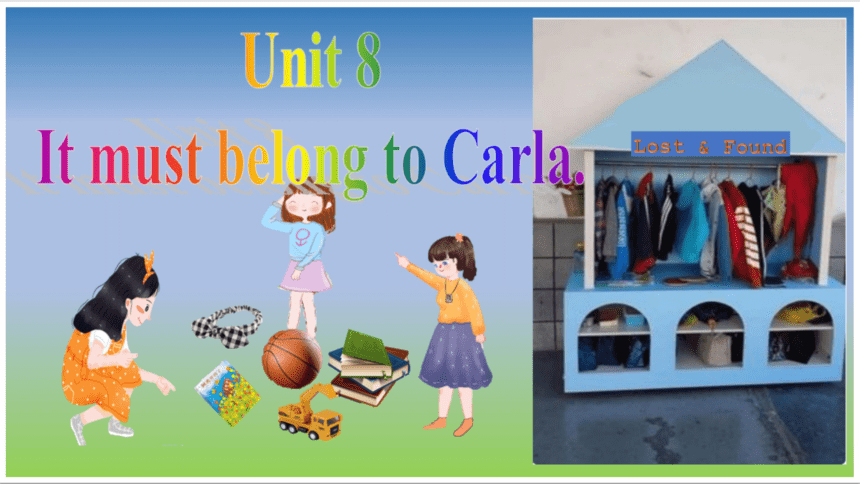 | |
| 格式 | zip | ||
| 文件大小 | 2.4MB | ||
| 资源类型 | 试卷 | ||
| 版本资源 | 人教新目标(Go for it)版 | ||
| 科目 | 英语 | ||
| 更新时间 | 2022-11-05 14:50:06 | ||
图片预览

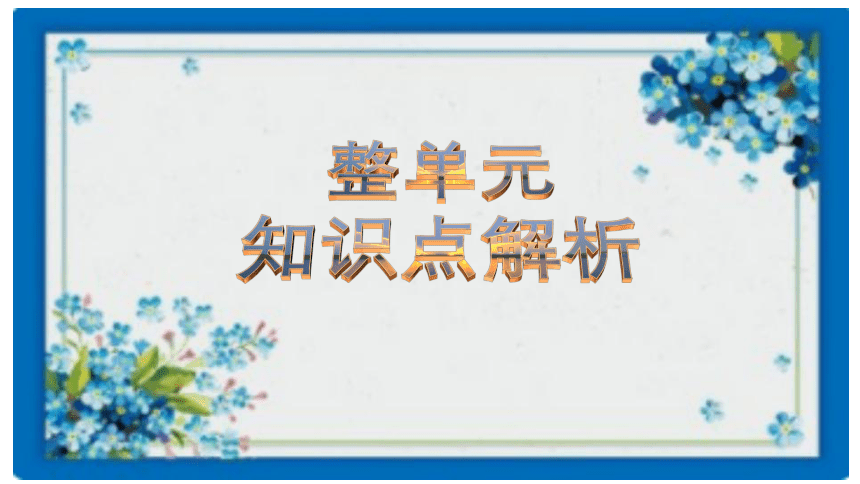
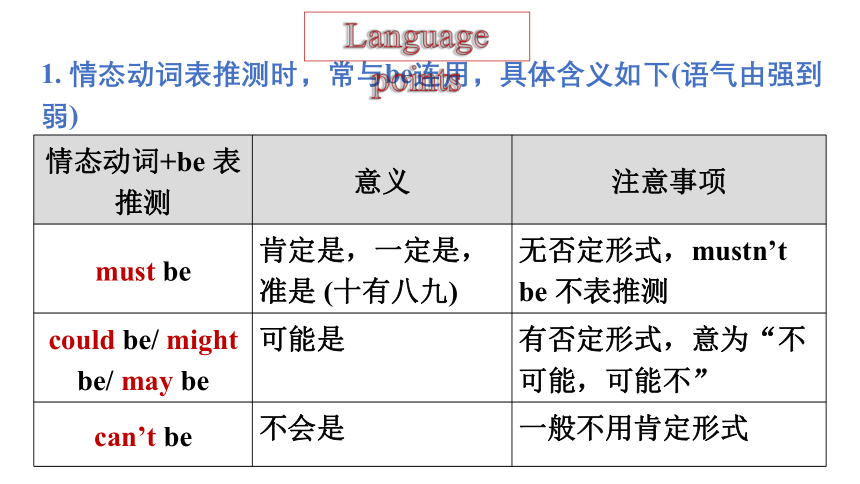
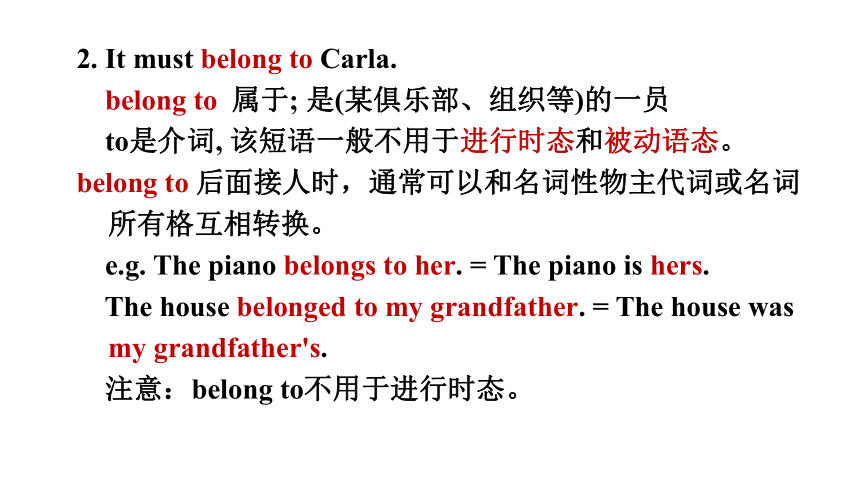
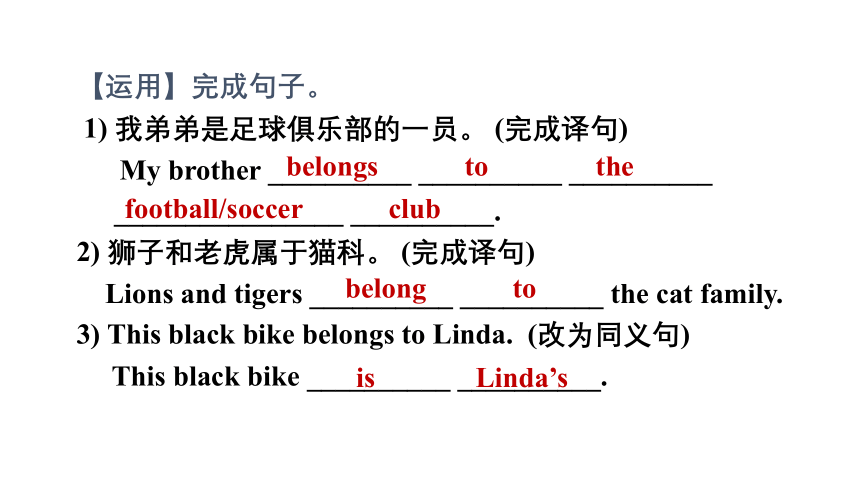
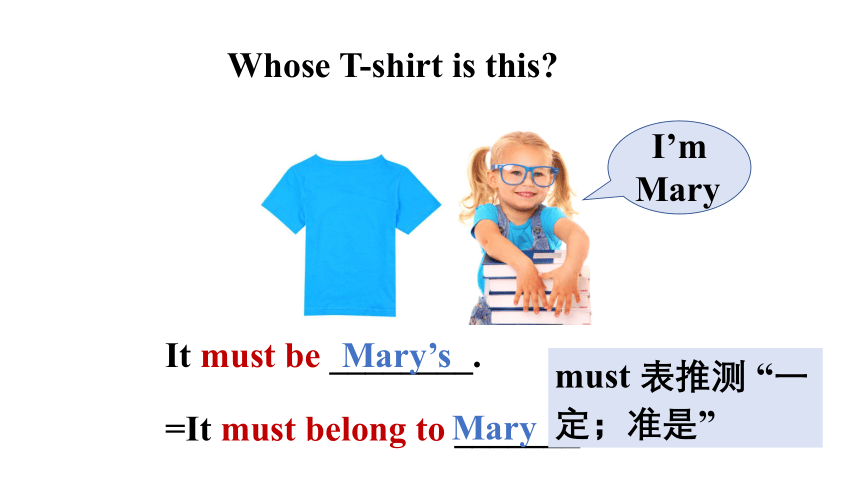
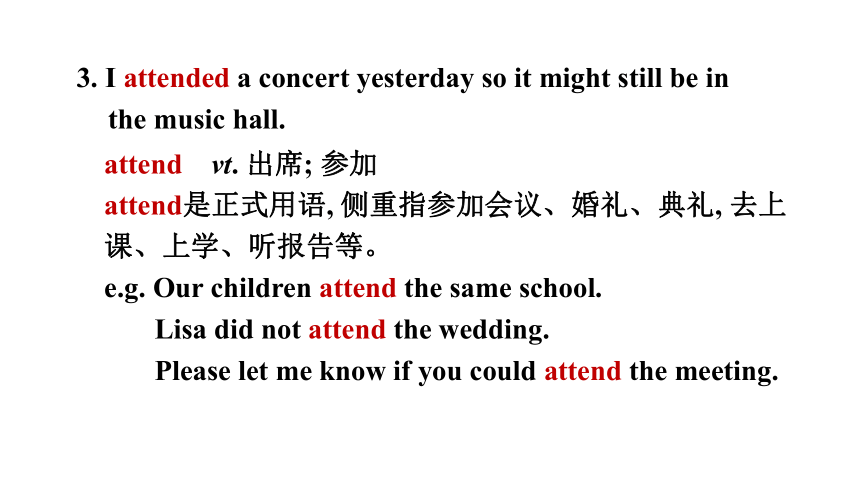
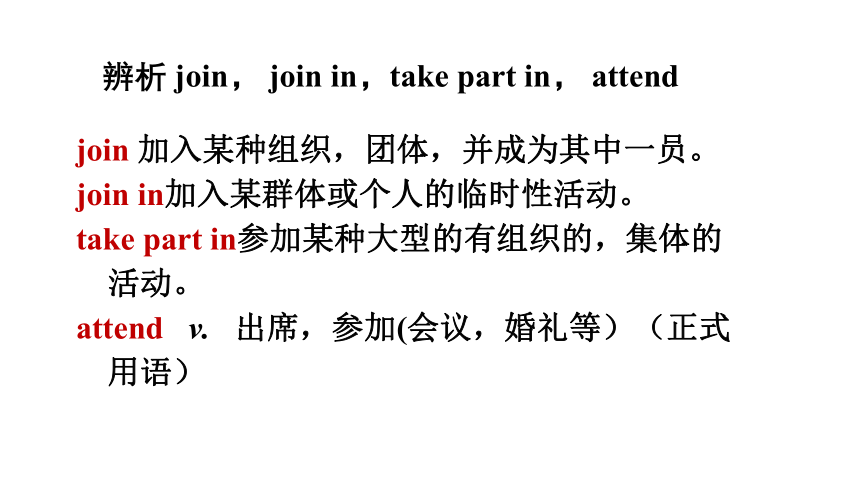
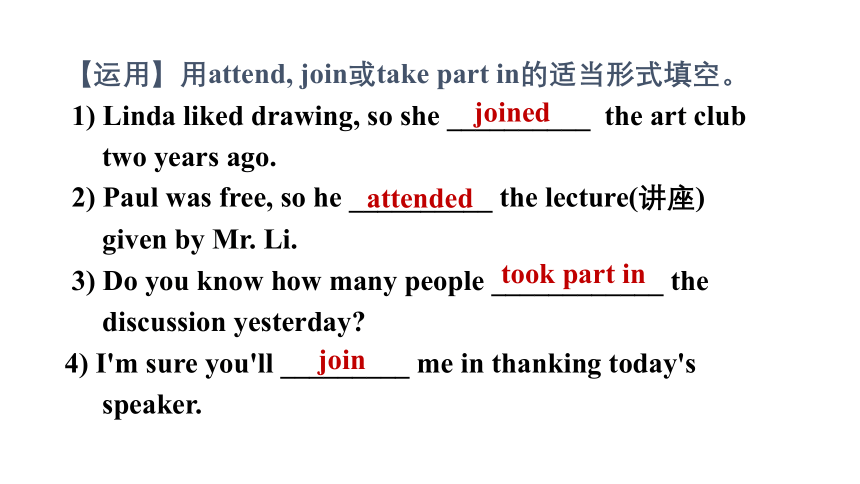
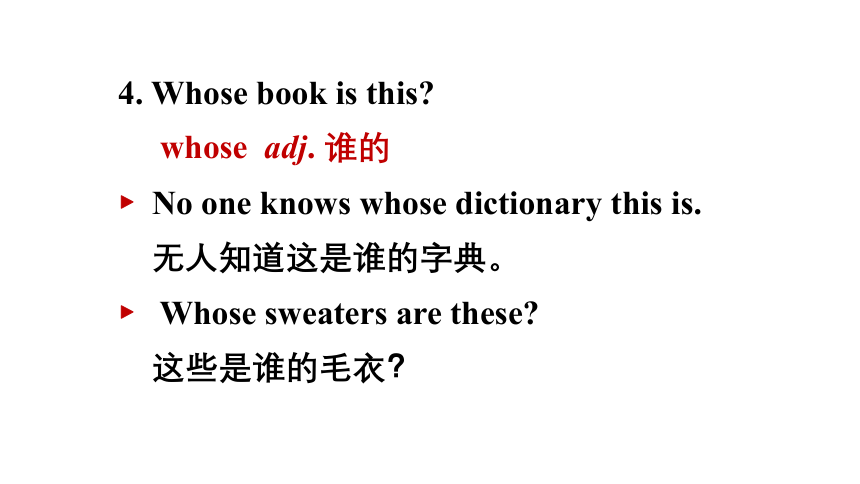
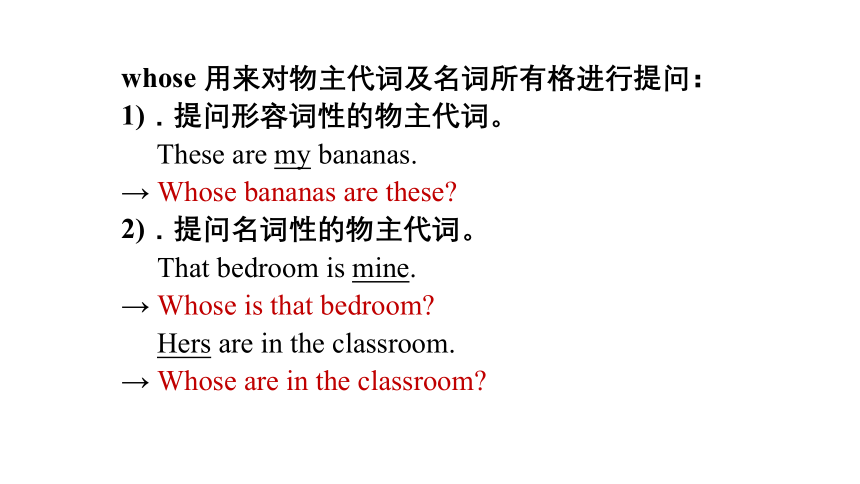
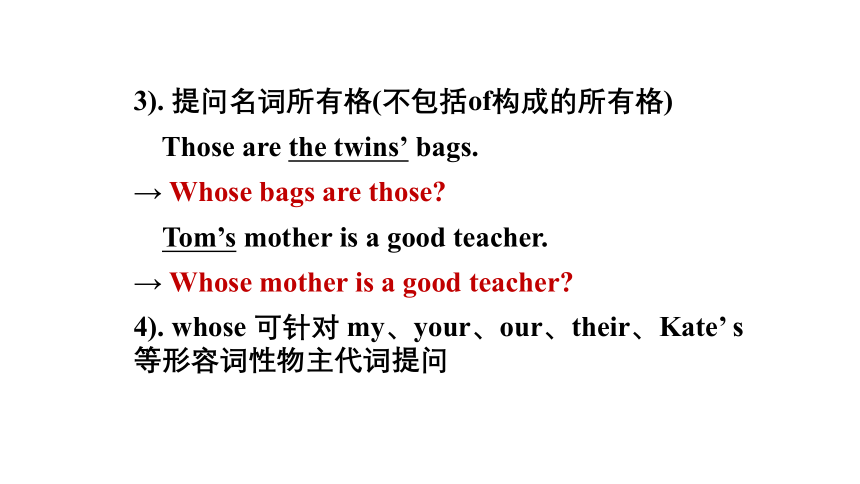
文档简介
(共59张PPT)
整单元
知识点解析
1. 情态动词表推测时,常与be连用,具体含义如下(语气由强到弱)
情态动词+be 表推测 意义 注意事项
must be 肯定是,一定是,准是 (十有八九) 无否定形式,mustn’t be 不表推测
could be/ might be/ may be 可能是 有否定形式,意为“不可能,可能不”
can’t be 不会是 一般不用肯定形式
Language points
2. It must belong to Carla.
belong to 属于; 是(某俱乐部、组织等)的一员
to是介词, 该短语一般不用于进行时态和被动语态。
belong to 后面接人时,通常可以和名词性物主代词或名词所有格互相转换。
e.g. The piano belongs to her. = The piano is hers.
The house belonged to my grandfather. = The house was my grandfather's.
注意:belong to不用于进行时态。
【运用】完成句子。
1) 我弟弟是足球俱乐部的一员。 (完成译句)
My brother __________ __________ __________ ________________ __________.
2) 狮子和老虎属于猫科。 (完成译句)
Lions and tigers __________ __________ the cat family.
3) This black bike belongs to Linda. (改为同义句)
This black bike __________ __________.
is Linda’s
belong to
belongs to the
football/soccer club
Whose T-shirt is this
It must be ________.
Mary’s
=It must belong to _______.
Mary
must 表推测 “一定;准是”
I’m Mary.
3. I attended a concert yesterday so it might still be in the music hall.
attend vt. 出席; 参加
attend是正式用语, 侧重指参加会议、婚礼、典礼, 去上课、上学、听报告等。
e.g. Our children attend the same school.
Lisa did not attend the wedding.
Please let me know if you could attend the meeting.
join 加入某种组织,团体,并成为其中一员。
join in加入某群体或个人的临时性活动。
take part in参加某种大型的有组织的,集体的活动。
attend v. 出席,参加(会议,婚礼等)(正式用语)
辨析 join, join in,take part in, attend
【运用】用attend, join或take part in的适当形式填空。
1) Linda liked drawing, so she __________ the art club two years ago.
2) Paul was free, so he __________ the lecture(讲座) given by Mr. Li.
3) Do you know how many people ____________ the discussion yesterday
4) I'm sure you'll _________ me in thanking today's speaker.
join
joined
attended
took part in
4. Whose book is this
whose adj. 谁的
No one knows whose dictionary this is.
无人知道这是谁的字典。
Whose sweaters are these
这些是谁的毛衣?
whose 用来对物主代词及名词所有格进行提问:
1).提问形容词性的物主代词。
These are my bananas.
→ Whose bananas are these
2).提问名词性的物主代词。
That bedroom is mine.
→ Whose is that bedroom
Hers are in the classroom.
→ Whose are in the classroom
3). 提问名词所有格(不包括of构成的所有格)
Those are the twins’ bags.
→ Whose bags are those
Tom’s mother is a good teacher.
→ Whose mother is a good teacher
4). whose 可针对 my、your、our、their、Kate’ s 等形容词性物主代词提问
who’s和whose的用法
who’s = who is,意思是“谁是”,who可以作主语、宾语或表语;
whose意思是“谁的”,可以作定语、也可作表语,放在名词前,如:
Whose desk is this = Whose is this desk
whose adj. & pron. 谁的
who pron. 谁
whom pron. 谁(宾格)
e.g. ---Whose volleyball is this
--- It must be Carla’s.
whose提问时的回答要用所有格形式,反之,答句有所有格,问句用whose。
5. Well, where did you last put it
last: adv. “上次;最近的一次;最后一次”;用于句末或句中
When I last saw her, she was working in Shanghai.
我上次见她时,她在上海工作。
When did you see him last
你最近见到他是什么时候?
6. Do you have anything valuable in your schoolbag
anything valuable 一些贵重的东西
形容词valuable修饰不定代词anything要后置。
当形容词修饰不定代词something, anything, nothing等时, 形容词应放在不定代词的后面。
【运用】请根据所给汉语提示完成句子。
1) I’d like to buy __________________ (一些漂亮的东西).
2) Is there __________________ (什么有趣的) in today’s newspaper
3) There is ______________ (没有毛病) with my bike.
something beautiful
anything interesting
nothing wrong
7. I think somebody must have picked it up.
must 表推测,“一定”;
must have done 表示对过去的推测,“过去一定做过了”
He’s playing outside. He must have finished his homework.
他在外边玩,一定已经把作业做完了。
8. I’ll call them now to check if anybody has it.
anybody pron. 任何人
常用于否定句或疑问句中;
用于肯定句中时, 相当于any person, “任何人”。
e.g. I will not tell anybody the secret.
Is there anybody in the office
Anybody could do it!
1. We live in a small town and almost everyone knows each other.
live in: 居住在……
live on sth: 以食......为生
We used to lived in London.
过去我们住在伦敦。
Small birds live mainly on insects.
小鸟主要靠食昆虫为生。
Language points
2. It used to be very quiet.
used to 过去经常;以前常常
表示过去的习惯性动作或经常性状态,可用于各种人称,后接动词原形。在构成否定句或疑问句时,可借助助动词did。
e.g. Amy used to listen to music.
You used to be short, but now you’re tall.
The Whites didn’t use to live here.
Did you use to spend much time playing games
结构 意义 to的作用
used to do sth. 过去常常做某事
不定式符号
use ... to do sth. 用……做……
be used to do sth. 被用来做……
be used to+ doing sth. 习惯于做某事 介词
【运用】根据提示完成英语句子。
1) My uncle _________________ (以前是个司机), but now he is an actor.
2) Tom’s father __________________ (过去常常看书) after lunch.
3) Mary _________________ (以前常常骑自行车) to work, but now she ________________ (习惯步行) to work.
4) The pencil _____________ (被用来书写).
used to be a driver
used to read (books)
used to ride a bike
is used to walking
is used to write
3. Every night we hear strange noises outside our window.
noise n. 声音;噪音
make (a) noise/noises 制造噪声
noisy adj. 吵闹的,有噪音的
【运用】单项选择
I live in a (an) _____ neighborhood. Many people and cars come and go very often.
quiet B. empty C. noisy D. lonely
C
noise, voice, sound
noise 噪音; 吵闹声 人们听到的不悦耳、不和谐的噪杂声。
voice 声音; 嗓音 人发出的声音,说笑、唱歌的声音。
sound 声音; 响声 自然界的各种声音,人声、鸟声、机器声等。
【运用】根据句意选用sound, voice或noise填空。
1) What a terrible ________! I can’t stand it.
2) Kate often reads in a loud ________.
3) There is no ________ in the classroom. Where are all the students
4) Don’t make any ________. Your brother is sleeping.
5) My sister has a very sweet ________.
voice
noise
voice
sound
noise
4. … but I couldn’t see a dog or anything else, either.
too 一般用于肯定句或疑问句的句尾
also 常用在肯定句或疑问句中,并且通常用在实义动词之前,系动词、助动词或情态动词之后。
either 常用在否定句的句尾
e.g. —I’m feeling tired.
—Me too.
The dictionary is useful and it’s cheap too.
Can I come too
—I can’t swim.
—I can’t, either.
Mary won’t go and Peter won’t go either.
I teach five days a week and I also teach evening classes.
He is young and good-looking, and he’s also very smart.
Sally can speak English and she can also speak Chinese.
【运用】根据句意选用too, either或also填空。
1) I can’t play the piano and my brother can’t ______.
2) Jack is in the school football team. Tony is ______ in it.
3) Liu Ting likes strawberries very much and she likes watermelons ________.
too
also
either
5. They think it might be the wind.
think + n./to do /从句
think about + n. /-ing/从句: 考虑,思索,回想,想起
think over + n. / 从句: 仔细想想,仔细考虑
I think that it is a good thing.
He is thinking about going on a trip to America.
Please think over what I’ve said.
6. One woman in the area saw something running away.
see sb. doing sth. 看见某人正在做某事
(强调动作正在发生)
see sb. do sth. 看见某人做某事
(强调发生的整个过程)
类似短语:
一感 feel 二听 listen to, hear
三看 watch, notice, see
e.g. 我看见妈妈正在厨房做饭。
I see my mom cooking in the kitchen.
露西说她看见我做家务了。
Lucy said she saw me do the housework.
7. There must be something visiting the homes in our neighborhood…
There must be sth./sb. doing sth.
一定有某物/某人正在做某事
表示对正在发生的事情的肯定推测
There is a cat _______ fish from the bowl.
A. steal B. stealing C. stole D. stolen
B
8. Everyone in our town is feeling uneasy, and everyone has his or her own ideas.
对不定代词 everyone 的指代方式
1.he or she/ she or he
在女性多的场合多用she指代
2.they
If anyone finds my glasses, could she/he let me know
If anyone finds my glasses, could they let me know
9. The noise-maker is having too much fun creating fear in the neighborhood.
noise-maker 合成词
(表达原词中的某种动宾关系,不仅用以指认,也可指物)
类似的复合名词:
shopkeeper 店主
bus conductor 公交售票员
taxi driver 出租车司机
gatekeeper 看门人
grass/meat-eater 食草、肉食动物
bottle opener 开瓶器
life detector 生命探测仪
have fun (doing sth.)
玩得高兴;过得愉快
类似:
enjoy oneself
enjoy doing sth.
have a good/ great/ lovely time (doing sth.)
反义:
It’s no fun/not much fun doing sth.
玩得不高兴;过得不舒坦
Come on, why aren’t you dancing Enjoy yourselves!
来吧,你们为什么不跳舞呢 尽兴玩吧!
We used to have great times talking together.
我们曾经常常交谈,很是开心。
It’s no fun eating on my own.
独自吃饭真无聊啊。
1. Whenever I try to read this book, I feel sleepy.
sleepy adj. 困的;想睡的。可作定语和表语。
asleep adj. 睡着的。强调状态,常作表语。
fall asleep 入睡;睡着
sleep v. 睡觉 n. 睡眠;睡觉
sleep, sleepy, asleep
Language points
【运用】根据句意, 用sleep, sleepy或asleep填空。
1) Look at that ________ dog.
2) Tom is _____________________. Please keep quiet.
3) I think people need eight hours of ________ a day.
4) Grandpa fell ________ when he was watching TV.
asleep
sleepy
sleep
sleeping / asleep / sleepy
1. A UFO is landing.
land v. 着陆;靠岸
They managed to land the helicopter safely.
他们想方设法使直升飞机安全着陆。
We landed at the airport in Beijing.
我们降落在北京机场。
The ship landed safely in the end.
船最后平安靠岸了。
Language points
land n. 陆地;国土;土地
The ship came safely to land.
船平安靠岸。
I love the land where I was born.
我爱我出生的这块土地。
The farmer has just bought a new piece of land.
这位农民刚刚又买了一块地。
2. He’s wearing a suit.
suit n. 西服;套装
That suit cost me over 600 yuan.
那件西服花去我600多元。
My brother wore a new suit for the party.
我哥哥穿一身新西服去参加晚会。
You'd better change into your new suit.
你最好换上你的那套新衣服。
注意:
suit作名词指“套装”时,可用词组a suit of clothes表达“一套衣服”,一般含外套,背心和裤子。注意:不可说a suit of cloth;
suit通常用作可数名词, 基本意思是“一套衣服”, 通常指用同一料子做成的男子的短上衣和裤子或女子的短上衣和裙子。
suit v. 适合,适宜于
suit sb. fine / well 很适合某人
Blue suits her very well, I think.
我认为蓝色很适合她。
注意 fit 作动词, 意为“合适”, 但常用于指大小、尺寸合适; suit 指颜色或款式适合。
The coat doesn’t fit me.
这件上衣我穿着不合身。
This dress suits you beautiful.
这件衣服你穿非常合适。
1. expressing a difference
express v. 表达, 表示
expression n. 表达, 表示, 表情
e.g. It expresses my love for the novel.
这表达了我对这部小说的热爱。
Bill's not afraid to express his opinions.
比尔从来不怕表达自己的观点。
expression of sympathy / thanks / regret
表达同情/感谢/遗憾
Language points
2. Every year it receives more than 750,000 visitors.
receive v. 接受;收到
e.g. All the children will receive a gift.
She received no support from her parents.
她没有得到父母的支持。
You will receive a warm welcome when you come to our school.
当你来到我们学校的时候,你会受到热烈的欢迎。
receive, accept
功能 receive accept 例句
从含义上说 只表示“收到”这一客观事实 主观上“接受” Yesterday I received his gift, but I didn’t accept it and returned it to him.
从搭配上说 表接受教育;受到(某种待遇);得到支持等,常用receive accept无此用法 All the children at this age should receive education.
(1) I will be happy if Sandy __________(接受) my offer.
(2) Julia __________(receive / accept) presents from her son on Mother’s Day every year.
(3) I went to the door to __________(receive / accept) those visitors.
(4) Li Hua __________(receive / accept) a warm welcome when she was in England.
【语境应用】完成句子。
accepts
receives
receive
received
3. For many years, historians believed Stonehenge was a temple where ancient leaders tried to communicate with the gods.
关系副词where引导的定语从句
本句中,where在定语从句中作地点状语,修饰名词temple。本句可译为:多年以来,历史学家们认为巨石阵是古代首领用来与神灵沟通的一座神庙。
许多年以来,历史学家认为巨石阵是古代首领用来与神灵沟通的一座寺庙。
For many years, historians believed Stonehenge was a temple where ancient leaders tried to communicate with the gods.
where 引导的定语从句修饰temple
try to do 努力做某事
communicate with 沟通;通话
宾语从句
4. Another popular idea is that Stonehenge might be a kind of calendar.
that引导的表语从句
位于系动词之后的从句通常称为表语从句。表语从句一定要用陈述语序;可接表语从句的动词还有look, remain, seem等连系动词;that引导表语从句,只起连接作用,不作句子成分。
请找出本文中另一个由how 引导的表语从句:
One of the greatest mysteries is how it was built because the stones are so big and heavy.
【语境应用】试着用表语从句翻译下面两句话。
1) 事实是我们已经失去了这个机会。
2) 问题是我们如何能找到他。
The fact is that we have lost the chance.
The problem is how we can find him.
5. The large stones were put together in a certain way.
in a certain way 以某种方式
certain 某一;某个;某些,用于名词之前
e.g. The doctor is only at this hospital on certain days.
那位医生只有在某些日子才在这所医院。
The library is only open at certain times of the day.
图书馆仅在一天的某些时段开放。
It’s wrong and dangerous to leave children under a certain age alone in the house.
把某个年龄以下的孩子独自留在家中是不对而且危险的。
6. Other people believe the stones have a medical purpose.
medical adj. 医疗的; 医学的
e.g. My sister studies at a medical college. She is a medical student.
我的姐姐在医学院上学。 她是医科学生。
【链接】
medicine n. 药;医学
take medicine 吃药
traditional Chinese medicine 传统的中国医学
7. They think the stones can prevent illness and keep people healthy.
prevent v. 防止; 预防; 阻止; 阻挠
prevent sb. (from) doing sth. 阻止某人做某事
=stop sb. (from) doing sth.
=keep sb. from doing sth.
e.g. What can we do to prevent the disease spreading
【思考】为什么keep sb. from doing sth.中的from不可省略?
【语境应用】汉译英。
1) 她阻止了我把这一秘密告诉她的朋友们。
She prevented / stopped me (from) telling her friends the secret. / She kept me from telling her friends the secret.
2) 对人们来说了解预防心脏病的方法是有必要的。
It’s necessary for people to know the ways to prevent heart disease.
8. As you walk there, you can feel the energy from your feet move up your body.
感官动词feel + 宾语+宾语补足语 (注意:不带to的动词不定式充当),其用法与see, hear, watch等词一样。
e.g. We felt the house shake.
I see him walk into the classroom.
His mother watched him get into a taxi.
宾语
宾语补足语
Language points
She is the only one who wears the colorful clothes.
她是唯一一个穿着鲜艳的人。
主句
定语从句
先行词
关系代词
这是一个含有定语从句的复合句。
The person ∧you saw at the supermarket can’t be Susan. I just talked to her on the phone and she is at work.
这是一个含有定语从句的复合句, 关系代词在定语从句中作宾语,可以省掉。
主句
定语从句
先行词
省掉that关系代词
整单元
知识点解析
1. 情态动词表推测时,常与be连用,具体含义如下(语气由强到弱)
情态动词+be 表推测 意义 注意事项
must be 肯定是,一定是,准是 (十有八九) 无否定形式,mustn’t be 不表推测
could be/ might be/ may be 可能是 有否定形式,意为“不可能,可能不”
can’t be 不会是 一般不用肯定形式
Language points
2. It must belong to Carla.
belong to 属于; 是(某俱乐部、组织等)的一员
to是介词, 该短语一般不用于进行时态和被动语态。
belong to 后面接人时,通常可以和名词性物主代词或名词所有格互相转换。
e.g. The piano belongs to her. = The piano is hers.
The house belonged to my grandfather. = The house was my grandfather's.
注意:belong to不用于进行时态。
【运用】完成句子。
1) 我弟弟是足球俱乐部的一员。 (完成译句)
My brother __________ __________ __________ ________________ __________.
2) 狮子和老虎属于猫科。 (完成译句)
Lions and tigers __________ __________ the cat family.
3) This black bike belongs to Linda. (改为同义句)
This black bike __________ __________.
is Linda’s
belong to
belongs to the
football/soccer club
Whose T-shirt is this
It must be ________.
Mary’s
=It must belong to _______.
Mary
must 表推测 “一定;准是”
I’m Mary.
3. I attended a concert yesterday so it might still be in the music hall.
attend vt. 出席; 参加
attend是正式用语, 侧重指参加会议、婚礼、典礼, 去上课、上学、听报告等。
e.g. Our children attend the same school.
Lisa did not attend the wedding.
Please let me know if you could attend the meeting.
join 加入某种组织,团体,并成为其中一员。
join in加入某群体或个人的临时性活动。
take part in参加某种大型的有组织的,集体的活动。
attend v. 出席,参加(会议,婚礼等)(正式用语)
辨析 join, join in,take part in, attend
【运用】用attend, join或take part in的适当形式填空。
1) Linda liked drawing, so she __________ the art club two years ago.
2) Paul was free, so he __________ the lecture(讲座) given by Mr. Li.
3) Do you know how many people ____________ the discussion yesterday
4) I'm sure you'll _________ me in thanking today's speaker.
join
joined
attended
took part in
4. Whose book is this
whose adj. 谁的
No one knows whose dictionary this is.
无人知道这是谁的字典。
Whose sweaters are these
这些是谁的毛衣?
whose 用来对物主代词及名词所有格进行提问:
1).提问形容词性的物主代词。
These are my bananas.
→ Whose bananas are these
2).提问名词性的物主代词。
That bedroom is mine.
→ Whose is that bedroom
Hers are in the classroom.
→ Whose are in the classroom
3). 提问名词所有格(不包括of构成的所有格)
Those are the twins’ bags.
→ Whose bags are those
Tom’s mother is a good teacher.
→ Whose mother is a good teacher
4). whose 可针对 my、your、our、their、Kate’ s 等形容词性物主代词提问
who’s和whose的用法
who’s = who is,意思是“谁是”,who可以作主语、宾语或表语;
whose意思是“谁的”,可以作定语、也可作表语,放在名词前,如:
Whose desk is this = Whose is this desk
whose adj. & pron. 谁的
who pron. 谁
whom pron. 谁(宾格)
e.g. ---Whose volleyball is this
--- It must be Carla’s.
whose提问时的回答要用所有格形式,反之,答句有所有格,问句用whose。
5. Well, where did you last put it
last: adv. “上次;最近的一次;最后一次”;用于句末或句中
When I last saw her, she was working in Shanghai.
我上次见她时,她在上海工作。
When did you see him last
你最近见到他是什么时候?
6. Do you have anything valuable in your schoolbag
anything valuable 一些贵重的东西
形容词valuable修饰不定代词anything要后置。
当形容词修饰不定代词something, anything, nothing等时, 形容词应放在不定代词的后面。
【运用】请根据所给汉语提示完成句子。
1) I’d like to buy __________________ (一些漂亮的东西).
2) Is there __________________ (什么有趣的) in today’s newspaper
3) There is ______________ (没有毛病) with my bike.
something beautiful
anything interesting
nothing wrong
7. I think somebody must have picked it up.
must 表推测,“一定”;
must have done 表示对过去的推测,“过去一定做过了”
He’s playing outside. He must have finished his homework.
他在外边玩,一定已经把作业做完了。
8. I’ll call them now to check if anybody has it.
anybody pron. 任何人
常用于否定句或疑问句中;
用于肯定句中时, 相当于any person, “任何人”。
e.g. I will not tell anybody the secret.
Is there anybody in the office
Anybody could do it!
1. We live in a small town and almost everyone knows each other.
live in: 居住在……
live on sth: 以食......为生
We used to lived in London.
过去我们住在伦敦。
Small birds live mainly on insects.
小鸟主要靠食昆虫为生。
Language points
2. It used to be very quiet.
used to 过去经常;以前常常
表示过去的习惯性动作或经常性状态,可用于各种人称,后接动词原形。在构成否定句或疑问句时,可借助助动词did。
e.g. Amy used to listen to music.
You used to be short, but now you’re tall.
The Whites didn’t use to live here.
Did you use to spend much time playing games
结构 意义 to的作用
used to do sth. 过去常常做某事
不定式符号
use ... to do sth. 用……做……
be used to do sth. 被用来做……
be used to+ doing sth. 习惯于做某事 介词
【运用】根据提示完成英语句子。
1) My uncle _________________ (以前是个司机), but now he is an actor.
2) Tom’s father __________________ (过去常常看书) after lunch.
3) Mary _________________ (以前常常骑自行车) to work, but now she ________________ (习惯步行) to work.
4) The pencil _____________ (被用来书写).
used to be a driver
used to read (books)
used to ride a bike
is used to walking
is used to write
3. Every night we hear strange noises outside our window.
noise n. 声音;噪音
make (a) noise/noises 制造噪声
noisy adj. 吵闹的,有噪音的
【运用】单项选择
I live in a (an) _____ neighborhood. Many people and cars come and go very often.
quiet B. empty C. noisy D. lonely
C
noise, voice, sound
noise 噪音; 吵闹声 人们听到的不悦耳、不和谐的噪杂声。
voice 声音; 嗓音 人发出的声音,说笑、唱歌的声音。
sound 声音; 响声 自然界的各种声音,人声、鸟声、机器声等。
【运用】根据句意选用sound, voice或noise填空。
1) What a terrible ________! I can’t stand it.
2) Kate often reads in a loud ________.
3) There is no ________ in the classroom. Where are all the students
4) Don’t make any ________. Your brother is sleeping.
5) My sister has a very sweet ________.
voice
noise
voice
sound
noise
4. … but I couldn’t see a dog or anything else, either.
too 一般用于肯定句或疑问句的句尾
also 常用在肯定句或疑问句中,并且通常用在实义动词之前,系动词、助动词或情态动词之后。
either 常用在否定句的句尾
e.g. —I’m feeling tired.
—Me too.
The dictionary is useful and it’s cheap too.
Can I come too
—I can’t swim.
—I can’t, either.
Mary won’t go and Peter won’t go either.
I teach five days a week and I also teach evening classes.
He is young and good-looking, and he’s also very smart.
Sally can speak English and she can also speak Chinese.
【运用】根据句意选用too, either或also填空。
1) I can’t play the piano and my brother can’t ______.
2) Jack is in the school football team. Tony is ______ in it.
3) Liu Ting likes strawberries very much and she likes watermelons ________.
too
also
either
5. They think it might be the wind.
think + n./to do /从句
think about + n. /-ing/从句: 考虑,思索,回想,想起
think over + n. / 从句: 仔细想想,仔细考虑
I think that it is a good thing.
He is thinking about going on a trip to America.
Please think over what I’ve said.
6. One woman in the area saw something running away.
see sb. doing sth. 看见某人正在做某事
(强调动作正在发生)
see sb. do sth. 看见某人做某事
(强调发生的整个过程)
类似短语:
一感 feel 二听 listen to, hear
三看 watch, notice, see
e.g. 我看见妈妈正在厨房做饭。
I see my mom cooking in the kitchen.
露西说她看见我做家务了。
Lucy said she saw me do the housework.
7. There must be something visiting the homes in our neighborhood…
There must be sth./sb. doing sth.
一定有某物/某人正在做某事
表示对正在发生的事情的肯定推测
There is a cat _______ fish from the bowl.
A. steal B. stealing C. stole D. stolen
B
8. Everyone in our town is feeling uneasy, and everyone has his or her own ideas.
对不定代词 everyone 的指代方式
1.he or she/ she or he
在女性多的场合多用she指代
2.they
If anyone finds my glasses, could she/he let me know
If anyone finds my glasses, could they let me know
9. The noise-maker is having too much fun creating fear in the neighborhood.
noise-maker 合成词
(表达原词中的某种动宾关系,不仅用以指认,也可指物)
类似的复合名词:
shopkeeper 店主
bus conductor 公交售票员
taxi driver 出租车司机
gatekeeper 看门人
grass/meat-eater 食草、肉食动物
bottle opener 开瓶器
life detector 生命探测仪
have fun (doing sth.)
玩得高兴;过得愉快
类似:
enjoy oneself
enjoy doing sth.
have a good/ great/ lovely time (doing sth.)
反义:
It’s no fun/not much fun doing sth.
玩得不高兴;过得不舒坦
Come on, why aren’t you dancing Enjoy yourselves!
来吧,你们为什么不跳舞呢 尽兴玩吧!
We used to have great times talking together.
我们曾经常常交谈,很是开心。
It’s no fun eating on my own.
独自吃饭真无聊啊。
1. Whenever I try to read this book, I feel sleepy.
sleepy adj. 困的;想睡的。可作定语和表语。
asleep adj. 睡着的。强调状态,常作表语。
fall asleep 入睡;睡着
sleep v. 睡觉 n. 睡眠;睡觉
sleep, sleepy, asleep
Language points
【运用】根据句意, 用sleep, sleepy或asleep填空。
1) Look at that ________ dog.
2) Tom is _____________________. Please keep quiet.
3) I think people need eight hours of ________ a day.
4) Grandpa fell ________ when he was watching TV.
asleep
sleepy
sleep
sleeping / asleep / sleepy
1. A UFO is landing.
land v. 着陆;靠岸
They managed to land the helicopter safely.
他们想方设法使直升飞机安全着陆。
We landed at the airport in Beijing.
我们降落在北京机场。
The ship landed safely in the end.
船最后平安靠岸了。
Language points
land n. 陆地;国土;土地
The ship came safely to land.
船平安靠岸。
I love the land where I was born.
我爱我出生的这块土地。
The farmer has just bought a new piece of land.
这位农民刚刚又买了一块地。
2. He’s wearing a suit.
suit n. 西服;套装
That suit cost me over 600 yuan.
那件西服花去我600多元。
My brother wore a new suit for the party.
我哥哥穿一身新西服去参加晚会。
You'd better change into your new suit.
你最好换上你的那套新衣服。
注意:
suit作名词指“套装”时,可用词组a suit of clothes表达“一套衣服”,一般含外套,背心和裤子。注意:不可说a suit of cloth;
suit通常用作可数名词, 基本意思是“一套衣服”, 通常指用同一料子做成的男子的短上衣和裤子或女子的短上衣和裙子。
suit v. 适合,适宜于
suit sb. fine / well 很适合某人
Blue suits her very well, I think.
我认为蓝色很适合她。
注意 fit 作动词, 意为“合适”, 但常用于指大小、尺寸合适; suit 指颜色或款式适合。
The coat doesn’t fit me.
这件上衣我穿着不合身。
This dress suits you beautiful.
这件衣服你穿非常合适。
1. expressing a difference
express v. 表达, 表示
expression n. 表达, 表示, 表情
e.g. It expresses my love for the novel.
这表达了我对这部小说的热爱。
Bill's not afraid to express his opinions.
比尔从来不怕表达自己的观点。
expression of sympathy / thanks / regret
表达同情/感谢/遗憾
Language points
2. Every year it receives more than 750,000 visitors.
receive v. 接受;收到
e.g. All the children will receive a gift.
She received no support from her parents.
她没有得到父母的支持。
You will receive a warm welcome when you come to our school.
当你来到我们学校的时候,你会受到热烈的欢迎。
receive, accept
功能 receive accept 例句
从含义上说 只表示“收到”这一客观事实 主观上“接受” Yesterday I received his gift, but I didn’t accept it and returned it to him.
从搭配上说 表接受教育;受到(某种待遇);得到支持等,常用receive accept无此用法 All the children at this age should receive education.
(1) I will be happy if Sandy __________(接受) my offer.
(2) Julia __________(receive / accept) presents from her son on Mother’s Day every year.
(3) I went to the door to __________(receive / accept) those visitors.
(4) Li Hua __________(receive / accept) a warm welcome when she was in England.
【语境应用】完成句子。
accepts
receives
receive
received
3. For many years, historians believed Stonehenge was a temple where ancient leaders tried to communicate with the gods.
关系副词where引导的定语从句
本句中,where在定语从句中作地点状语,修饰名词temple。本句可译为:多年以来,历史学家们认为巨石阵是古代首领用来与神灵沟通的一座神庙。
许多年以来,历史学家认为巨石阵是古代首领用来与神灵沟通的一座寺庙。
For many years, historians believed Stonehenge was a temple where ancient leaders tried to communicate with the gods.
where 引导的定语从句修饰temple
try to do 努力做某事
communicate with 沟通;通话
宾语从句
4. Another popular idea is that Stonehenge might be a kind of calendar.
that引导的表语从句
位于系动词之后的从句通常称为表语从句。表语从句一定要用陈述语序;可接表语从句的动词还有look, remain, seem等连系动词;that引导表语从句,只起连接作用,不作句子成分。
请找出本文中另一个由how 引导的表语从句:
One of the greatest mysteries is how it was built because the stones are so big and heavy.
【语境应用】试着用表语从句翻译下面两句话。
1) 事实是我们已经失去了这个机会。
2) 问题是我们如何能找到他。
The fact is that we have lost the chance.
The problem is how we can find him.
5. The large stones were put together in a certain way.
in a certain way 以某种方式
certain 某一;某个;某些,用于名词之前
e.g. The doctor is only at this hospital on certain days.
那位医生只有在某些日子才在这所医院。
The library is only open at certain times of the day.
图书馆仅在一天的某些时段开放。
It’s wrong and dangerous to leave children under a certain age alone in the house.
把某个年龄以下的孩子独自留在家中是不对而且危险的。
6. Other people believe the stones have a medical purpose.
medical adj. 医疗的; 医学的
e.g. My sister studies at a medical college. She is a medical student.
我的姐姐在医学院上学。 她是医科学生。
【链接】
medicine n. 药;医学
take medicine 吃药
traditional Chinese medicine 传统的中国医学
7. They think the stones can prevent illness and keep people healthy.
prevent v. 防止; 预防; 阻止; 阻挠
prevent sb. (from) doing sth. 阻止某人做某事
=stop sb. (from) doing sth.
=keep sb. from doing sth.
e.g. What can we do to prevent the disease spreading
【思考】为什么keep sb. from doing sth.中的from不可省略?
【语境应用】汉译英。
1) 她阻止了我把这一秘密告诉她的朋友们。
She prevented / stopped me (from) telling her friends the secret. / She kept me from telling her friends the secret.
2) 对人们来说了解预防心脏病的方法是有必要的。
It’s necessary for people to know the ways to prevent heart disease.
8. As you walk there, you can feel the energy from your feet move up your body.
感官动词feel + 宾语+宾语补足语 (注意:不带to的动词不定式充当),其用法与see, hear, watch等词一样。
e.g. We felt the house shake.
I see him walk into the classroom.
His mother watched him get into a taxi.
宾语
宾语补足语
Language points
She is the only one who wears the colorful clothes.
她是唯一一个穿着鲜艳的人。
主句
定语从句
先行词
关系代词
这是一个含有定语从句的复合句。
The person ∧you saw at the supermarket can’t be Susan. I just talked to her on the phone and she is at work.
这是一个含有定语从句的复合句, 关系代词在定语从句中作宾语,可以省掉。
主句
定语从句
先行词
省掉that关系代词
同课章节目录
- Unit 1 How can we become good learners.
- Section A
- Section B
- Unit 2 I think that mooncakes are delicious!
- Section A
- Section B
- Unit 3 Could you please tell me where the restroom
- Section A
- Section B
- Unit 4 I used to be afraid of the dark.
- Section A
- Section B
- Unit 5 What are the shirts made of?
- Section A
- Section B
- Review of Units 1-5
- Unit 6 When was it invented?
- Section A
- Section B
- Unit 7 Teenagers should be allowed to choose their
- Section A
- Section B
- Unit 8 It must belong to Carla.
- Section A
- Section B
- Unit 9 I like music that I can dance to.
- Section A
- Section B
- Unit 10 You're supposed to shake hands.
- Section A
- Section B
- Review of Units 6-10
- Unit 11 Sad movies make me cry.
- Section A
- Section B
- Unit 12 Life is full of the unexpected
- Section A
- Section B
- Unit 13 We're trying to save the earth!
- Section A
- Section B
- Unit 14 I remember meeting all of you in Grade 7.
- Section A
- Section B
- Review of Units 11-14
